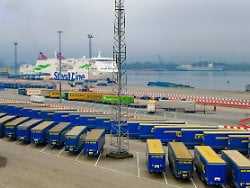Friday, January 07, 2022
DIHK: Plus thanks to higher prices
Exports are increasing despite persistent problems
Delivery bottlenecks, scarcity of raw materials, more expensive energy: the economic recovery is still being held back by many problems. After all, the demand for “Made in Germany” is great. But companies cannot necessarily hope for a quick improvement in production conditions.
Shortly before the end of the year, Germany’s companies were able to significantly increase their foreign sales again. And the increase could have been even greater, because massive delivery bottlenecks are still ensuring that not all orders in the full order books can be processed quickly as usual. Ultimately, goods worth 125.7 billion euros went to customers outside the country’s borders in November, according to the Federal Statistical Office. Compared to the previous month, this was an increase of 1.7 percent. For the year as a whole, sales even increased by more than twelve percent.
But the industry association BGA leaves little room for joy: “We cannot assume that foreign trade will develop so splendidly in the coming months, even if that would of course be desirable,” said Dirk Jandura, President of the Federal Association of Wholesale, Foreign Trade, Services (BGA). Problems in logistics, delivery bottlenecks for raw materials and preliminary products, high energy prices and, last but not least, the uncertain pandemic development remained factors that could stop the upward trend.
In the first eleven months of last year, foreign trade significantly exceeded the result of the Corona crisis year: From January through November of last year, exports recorded an increase of almost 14 percent to 1.26 trillion euros. Imports rose even more sharply by 16.1 percent to just under 1.1 trillion euros. According to the assessment of the German Chamber of Commerce and Industry (DIHK), however, German foreign trade is “still moving in difficult waters”. For the export growth, price increases are mainly responsible and not higher quantities, said DIHK foreign trade director Volker Treier. After all, the order books of German industry are well filled.
The consequences of the partial shortage of goods for further processing can meanwhile be seen in industrial production, which fell in November both on the previous month (minus 0.2 percent) and on the same month last year (minus 2.4 percent). The exports sent a glimmer of hope. “Without production, however, the export boom will be short-lived,” says ING chief economist Carsten Brzeski. “Delivery bottlenecks keep German industry in a stranglehold.” Commerzbank expert Christoph Weil is also convinced: Only when the material bottlenecks have been overcome will “there be a return to old levels in production too”.
According to the Ifo Institute, the shortage of materials in German industry worsened again in December. Around 82 percent of the companies surveyed by the economic research institute complained of bottlenecks and problems in the procurement of primary products and raw materials – more than ever before. It is paradoxical, said Ifo survey leader Klaus Wohlrabe recently: “The order books are full. However, the shortage of materials does not allow companies to ramp up their production accordingly.”
